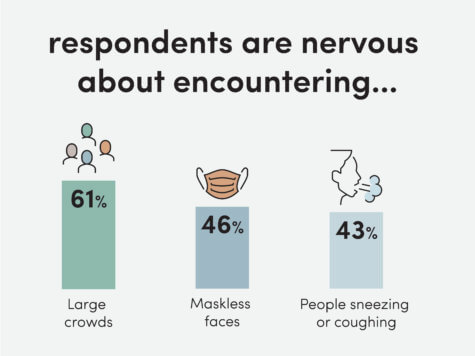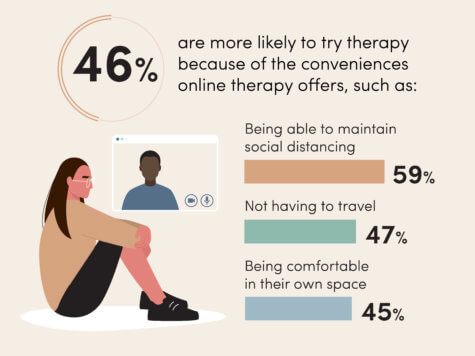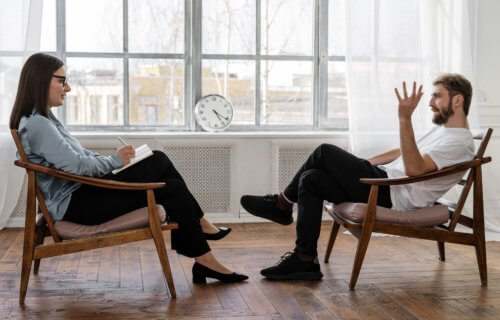NEW YORK — Summer may be here, but not everyone is apparently embracing a return to normalcy. Seven in 10 Americans are “anxious” over the thought of returning to their pre-pandemic lives.
That’s according to a new study of 2,000 U.S. residents, which examined what impact the COVID-19 pandemic might have on the long-term mental health of respondents. Large crowds (61%), maskless faces (46%), and people sneezing or coughing (43%) all rank high on the list of potential post-pandemic anxiety triggers.
Nearly two-thirds of respondents even say they’ll continue wearing masks after the pandemic due to anxiety about germs.
Help getting back to the grind in a post-pandemic world
Conducted by OnePoll on behalf of Hims & Hers, the study revealed that more than half of respondents (54%) would like to speak to a mental health professional before returning to their pre-pandemic life.
 More than three-quarters haven’t wanted to be forthcoming with loved ones because they don’t want to be an “emotional burden,” as many are suffering this year. As a result, people have adjusted their language to lighten how they’re really feeling, using phrases like “I’m fine” (53%) and “hanging in there” (36%).
More than three-quarters haven’t wanted to be forthcoming with loved ones because they don’t want to be an “emotional burden,” as many are suffering this year. As a result, people have adjusted their language to lighten how they’re really feeling, using phrases like “I’m fine” (53%) and “hanging in there” (36%).
Meanwhile, 74 percent of people appreciate that others confide in them, but add it’s a lot to handle emotionally during this uniquely stressful time. Half of the respondents are considering therapy for the first time in their life due to the pandemic.
“Confiding in a licensed mental health professional has numerous advantages; for one thing, it’s a neutral zone where you can share your concerns with someone who is able to provide you with tools and guidance that can help to make you feel better,” says a spokesperson for Hims & Hers in a statement. “Often, people downplay how they’re feeling or don’t seek the care they need because of many roadblocks — one of which being the shame they feel about their mental health due to it unfortunately still being so stigmatized. With that said, we’re really encouraged to see the results of this survey in terms of people being more open and understanding about seeking mental healthcare as we navigate our way through the pandemic.”
De-stigmatizing therapy
 The pandemic is also altering people’s perceptions of therapy, with 35 percent saying they’ve become more open to it and 34 percent admitting they’re less judgmental of those who may need it. Of those who already tried therapy (about 700 respondents), 87 percent now prefer online therapy to in-person sessions. Moreover, nine in 10 of that group believe online therapy can be just as helpful as in-person therapy.
The pandemic is also altering people’s perceptions of therapy, with 35 percent saying they’ve become more open to it and 34 percent admitting they’re less judgmental of those who may need it. Of those who already tried therapy (about 700 respondents), 87 percent now prefer online therapy to in-person sessions. Moreover, nine in 10 of that group believe online therapy can be just as helpful as in-person therapy.
Nearly half the poll (46%) think they’d be more likely to try therapy because of the conveniences online therapy offers. Those include being able to maintain social distance (59%), not having to travel to therapy (47%), and being comfortable in their own space (45%).
“The conveniences associated with online therapy are undeniable,” the spokesperson adds. “It’s great to hear that people are more accepting of seeking mental healthcare, but also that they are finding online therapy to be just as helpful as in-person therapy, and even preferable in some cases because of the convenience it offers.
“More and more businesses are doing the important work of meeting people where they are and offering what works best for them, and that needs to be the status quo with healthcare, too. Being a part of the wave of digitization when it comes to mental healthcare is incredibly rewarding, especially considering the shift we’re seeing in people’s perceptions about therapy.”
